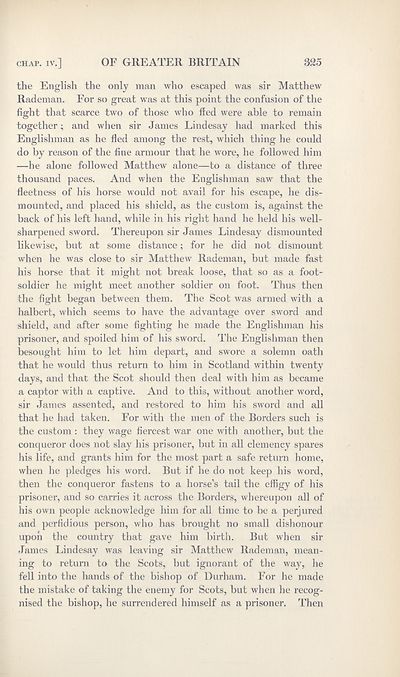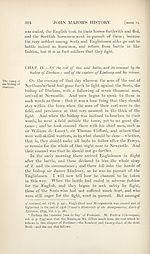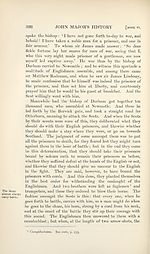Series 1 > History of Greater Britain, as well England as Scotland
(470) Page 325
Download files
Complete book:
Individual page:
Thumbnail gallery: Grid view | List view

CHAP. IV.]
OF GREATER BRITAIN
325
the English the only man who escaped was sir Matthew
Rademan. For so great was at this point the confusion of the
fight that scarce two of those who fled were able to remain
together; and when sir James Lindesay had marked this
Englishman as he fled among the rest, which thing he could
do by reason of the fine armour that he wore, he followed him
—he alone followed Matthew alone—to a distance of three
thousand paces. And when the Englishman saw that the
fleetness of his horse would not avail for his escape, he dis¬
mounted, and placed his shield, as the custom is, against the
back of his left hand, while in his right hand he held his well-
sharpened sword. Thereupon sir James Lindesay dismounted
likewise, but at some distance; for he did not dismount
when he was close to sir Matthew Rademan, but made fast
his horse that it might not break loose, that so as a foot-
soldier he might meet another soldier on foot. Thus then
the fight began between them. The Scot was armed with a
halbert, which seems to have the advantage over sword and
shield, and after some fighting he made the Englishman his
prisoner, and spoiled him of his sword. The Englishman then
besought him to let him depart, and swore a solemn oath
that he would thus return to him in Scotland within twenty
days, and that the Scot should then deal with him as became
a captor with a captive. And to this, without another word,
sir James assented, and restored to him his sword and all
that he had taken. For with the men of the Borders such is
the custom : they wage fiercest war one with another, but the
conqueror does not slay his prisoner, but in all clemency spares
his life, and grants him for the most part a safe return home,
when he pledges his word. But if he do not keep his word,
then the conqueror fastens to a horse’s tail the effigy of his
prisoner, and so carries it across the Borders, whereupon all of
his own people acknowledge him for all time to be a perjured
and perfidious person, who has brought no small dishonour
upon the country that gave him birth. But when sir
James Lindesay was leaving sir Matthew Rademan, mean¬
ing to return to the Scots, but ignorant of the way, he
fell into the hands of the bishop of Durham. For he made
the mistake of taking the enemy for Scots, but when he recog¬
nised the bishop, he surrendered himself as a prisoner. Then
OF GREATER BRITAIN
325
the English the only man who escaped was sir Matthew
Rademan. For so great was at this point the confusion of the
fight that scarce two of those who fled were able to remain
together; and when sir James Lindesay had marked this
Englishman as he fled among the rest, which thing he could
do by reason of the fine armour that he wore, he followed him
—he alone followed Matthew alone—to a distance of three
thousand paces. And when the Englishman saw that the
fleetness of his horse would not avail for his escape, he dis¬
mounted, and placed his shield, as the custom is, against the
back of his left hand, while in his right hand he held his well-
sharpened sword. Thereupon sir James Lindesay dismounted
likewise, but at some distance; for he did not dismount
when he was close to sir Matthew Rademan, but made fast
his horse that it might not break loose, that so as a foot-
soldier he might meet another soldier on foot. Thus then
the fight began between them. The Scot was armed with a
halbert, which seems to have the advantage over sword and
shield, and after some fighting he made the Englishman his
prisoner, and spoiled him of his sword. The Englishman then
besought him to let him depart, and swore a solemn oath
that he would thus return to him in Scotland within twenty
days, and that the Scot should then deal with him as became
a captor with a captive. And to this, without another word,
sir James assented, and restored to him his sword and all
that he had taken. For with the men of the Borders such is
the custom : they wage fiercest war one with another, but the
conqueror does not slay his prisoner, but in all clemency spares
his life, and grants him for the most part a safe return home,
when he pledges his word. But if he do not keep his word,
then the conqueror fastens to a horse’s tail the effigy of his
prisoner, and so carries it across the Borders, whereupon all of
his own people acknowledge him for all time to be a perjured
and perfidious person, who has brought no small dishonour
upon the country that gave him birth. But when sir
James Lindesay was leaving sir Matthew Rademan, mean¬
ing to return to the Scots, but ignorant of the way, he
fell into the hands of the bishop of Durham. For he made
the mistake of taking the enemy for Scots, but when he recog¬
nised the bishop, he surrendered himself as a prisoner. Then
Set display mode to:
![]() Universal Viewer |
Universal Viewer | ![]() Mirador |
Large image | Transcription
Mirador |
Large image | Transcription
Images and transcriptions on this page, including medium image downloads, may be used under the Creative Commons Attribution 4.0 International Licence unless otherwise stated. ![]()
| Scottish History Society volumes > Series 1 > History of Greater Britain, as well England as Scotland > (470) Page 325 |
|---|
| Permanent URL | https://digital.nls.uk/127737405 |
|---|
| Attribution and copyright: |
|
|---|
| Description | Over 180 volumes, published by the Scottish History Society, containing original sources on Scotland's history and people. With a wide range of subjects, the books collectively cover all periods from the 12th to 20th centuries, and reflect changing trends in Scottish history. Sources are accompanied by scholarly interpretation, references and bibliographies. Volumes are usually published annually, and more digitised volumes will be added as they become available. |
|---|


